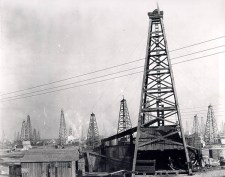Is there a connection? Historians press – perhaps too hard – for answers.

This is a belated report from the American Historical Associa-
tion/American Society of Church History conference, held in New
York City the first week of January. Excellent sessions on American religious history abounded, with a surprising number of them scheduled on the AHA program. My hunch is that this abundance has something to do with the relative scarcity of American Christian history on the program at the American Academy of Religion, the other major conference for scholars in this field, but that’s my own professional bugaboo, not worth ranting about here.
Anyhow, I’d like to focus on one AHA session, titled, “Oil, Coal, and Conservative Religion in the Twentieth Century.” (In the interest of full disclosure, I worked with four of the five scholars involved with this session at Duke or the University of North Carolina, so I’m not exactly choosing it at random.)
The first paper, by Brendan Pietsch at Duke, dug into the mind of Ly-
man Stewart, the early twentieth-century oil tycoon who bankrolled

The Fundamentals. Drawing on Stewart’s writings, the paper found an alchemical link between drilling and evangelism, as Stewart repeatedly professed a desire to transmute oil wealth into “living gospel truth” as quickly as possible. The paper also sketched a link
between the breathless search for new reserves –
Stewart was known to sniff for oil in gopher holes – and a similarly exhilarating search for hidden truths in the Bible’s prophetic passages.
The second paper, presented by Seth Dowland, also of Duke, told the story of coincident school boycotts and coal miners’ strikes in West Virginia in 1974. First, angry about new language arts textbooks they called “trashy, filthy, and too one-sided,” conservative Christian parents pulled their children out of the Kanawha County public schools. A few days later, the country’s coal miners, including many from the same area of West Virginia, struck for higher wages and better health benefits. A miner who lived down the street from the head of the United Mine Workers of America told the Charleston Gazette, “I don’t think there will be anybody back to work until those textbooks are out.” Dowland went on to detail the ways two groups of disgruntled West Virginians came together in a “populist revolt that captivated the nation.”
Finally, Darren Dochuck of Purdue University elucidated the little-known career of R.G. LeTourneau, extraction industry pioneer, defense contractor extraordinaire, and founder of an eponymous evangelical university specializing in the training of engineers. Dochuck called his paper, “Extracted Truth: The Politics of God and Black Gold in Post-World War II America.” he depicted LeTourneau as a man absolutely convinced that he moved mountains of dirt for the glory of God.
Causality Crusade
Katie Lofton, soon to join the faculty of Yale University, responded to these papers. She pressed all of the presenters to identify causal relationships between the phenomena on which they reported. To paraphrase her questions, Did Lyman Stewart’s belief in an imminent Second Coming propel him into the oilfields and govern the decisions he made there? Did West Virginia coal miners really walk off their jobs because they didn’t like an English textbook? Did LeTourneau’s evangelicalism predetermine his alliance with the New Right (including the Bush family) and indifference to the environmental consequences of extraction?
In several ways, the papers begged such questions. All three had linked the energy industry and evangelicalism with an “and,” but none had stated an emphatic “because.” Additionally, each paper quoted at least one figure providing religious justification for his or her actions. The causal connection leapt out of the sources, putting the historians on the spot. If a historical actor writes that God instructed him to dig his well right here, or move that particular mound of dirt, on what grounds may a scholar argue otherwise? On the other hand, aren’t scholars expected to probe such claims? If historians cannot add context and critical analysis to the primary sources, libraries ought to trade out all of their monographs for photocopied diaries and letters.
The Suction Hypothesis
In other ways, though, the causality crusade made me uneasy, because it seemed to single out conservative religion. By way of contrast, my dissertation on The Christian Century noted that the magazine derived significant financial support from William H. Hoover of Hoover vacuum fame, but none of my readers asked me for a causal link between suction and liberal Protestantism. The re-founding editor of the Century was a Disciples of Christ minister, Hoover was a Disciples layman, and no further connection seemed necessary. Does theology always reign supreme among conservative Christians’ motivations? Does conservative – especially Fundamentalist – Christianity strike scholars as so exotic that it obscures other lines of inquiry? In short, are conservative Christians treated differently by historians than members of different traditions, and, if so, how and why?
None of this is to suggest that I found the AHA session hostile or biased. The stories told by the presenters deserve more attention, and the ensuing discussion clarified some issues while complicating others, which is exactly what academic conferences are supposed to do. I left thinking more about my own motivations and about the kinds of questions I pose to historical actors. Should I look for a link between suction (or perhaps broader subjects like cleanliness and domesticity) and liberal Protestantism? I’ll let you know if I find any.









